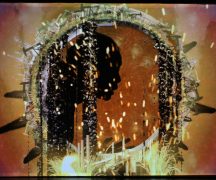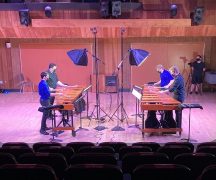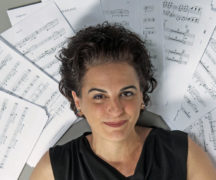By DAVID DUPONT
BG Independent News
When David Bowie died in January, 2016, composer and performer Evan Ziporyn was deeply moved.
He’d long been a devotee of Bowie’s music as had so many of his friends and colleagues across the musical spectrum.
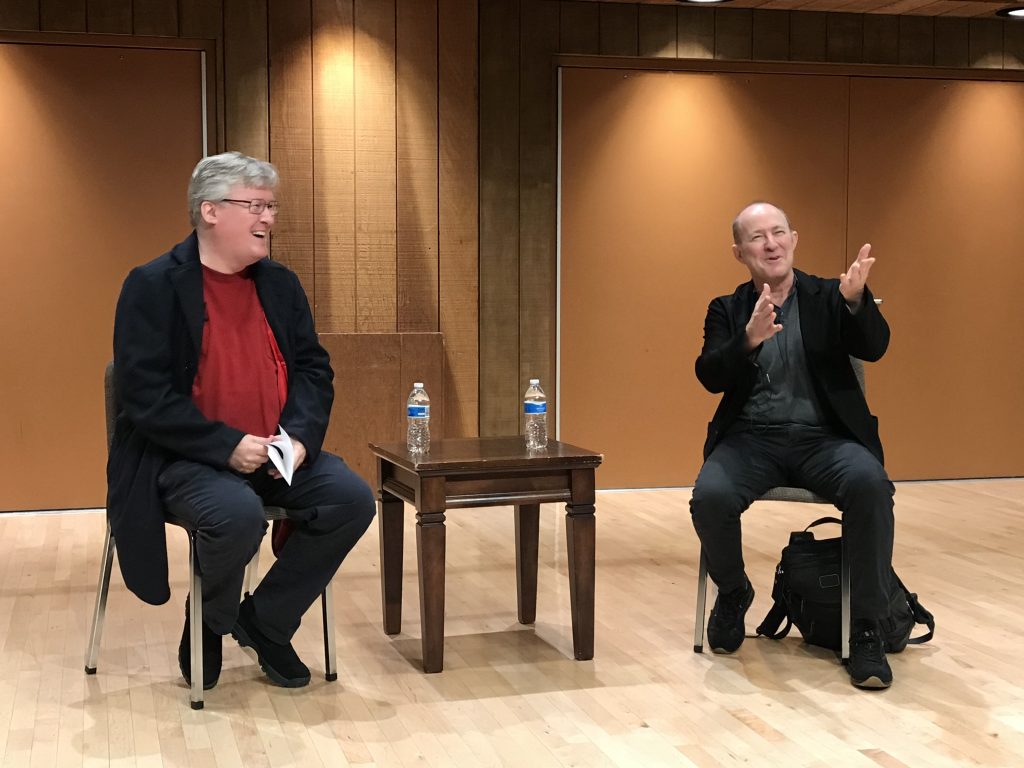
One of those friends said that given Bowie’s importance, someone should stage some kind of tribute. Ziporyn, a professor of music at MIT, decided he had the resources to do it.
He figured he could gather an orchestra to perform Phillip Glass’ two symphonies inspired by the rock legend’s music.
What he got was an outpouring of musicians who wanted to volunteer their time for the concert that was staged at MIT as a benefit for the school’s cancer research center.
More than the performance or the money raised, the concert “felt like some kind of necessary community gathering,” Ziporyn said during his composer’s talk at the New Music Festival, now underway at Bowling Green State University.
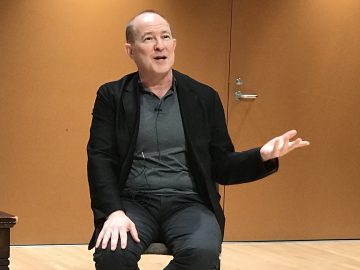
“We always hear orchestra is dying, it’s irrelevant,” Ziporyn said. “But it’s not irrelevant. There are still a huge amount of musicians who want to play orchestra music. But it’s also this mechanism, this idea of getting that amount of people together, thinking the same thing, doing the same thing, breathing together, moving together, harmonizing together, rhythmisizing together, and having an audience for that purpose.”
He added: “That’s a more vital idea than ever. We spend all our time doing this.” He gestured as if looking at his phone.
“We’re separated from each other. We don’t go to the used store, you to go to your phone or go to your computer to connect with music.”
When he was coming up as a teenager or later as a student at Eastman and Yale, “you had to connect with people to connect with music . Now you just go to YouTube. You download it.”
In the talk he recalled how he discovered Balinese gamelan music. He was working at a used record store in New Haven, Connecticut, shelving records when someone played “Music from the Morning of the World,” the record that introduced so many Western listeners to those sounds from Indonesia.
Ziporyn was captivated by “these amazing chords, amazing textures, amazing rhythms,” he said.
It contained all the elements of the music he loved — Miles Davis’ “Bitches Brew,” Bela Bartok’s string quartets, Stravinsky’s “The Rite of Spring.”
“It was almost like it was from Mars,” he said.
Shortly after he learned of someone who had a gamelan, and that summer he headed to the West Coast to perform with the orchestra.
On Friday afternoon at the festival, the university’s Kusuma Sari Balinese Gamelan along with a saxophone quartet performed “Kekembangan” a 1990 collaboration between Ziporyn and I Nyoman Windha. It was the first time in 30 years the piece was performed.
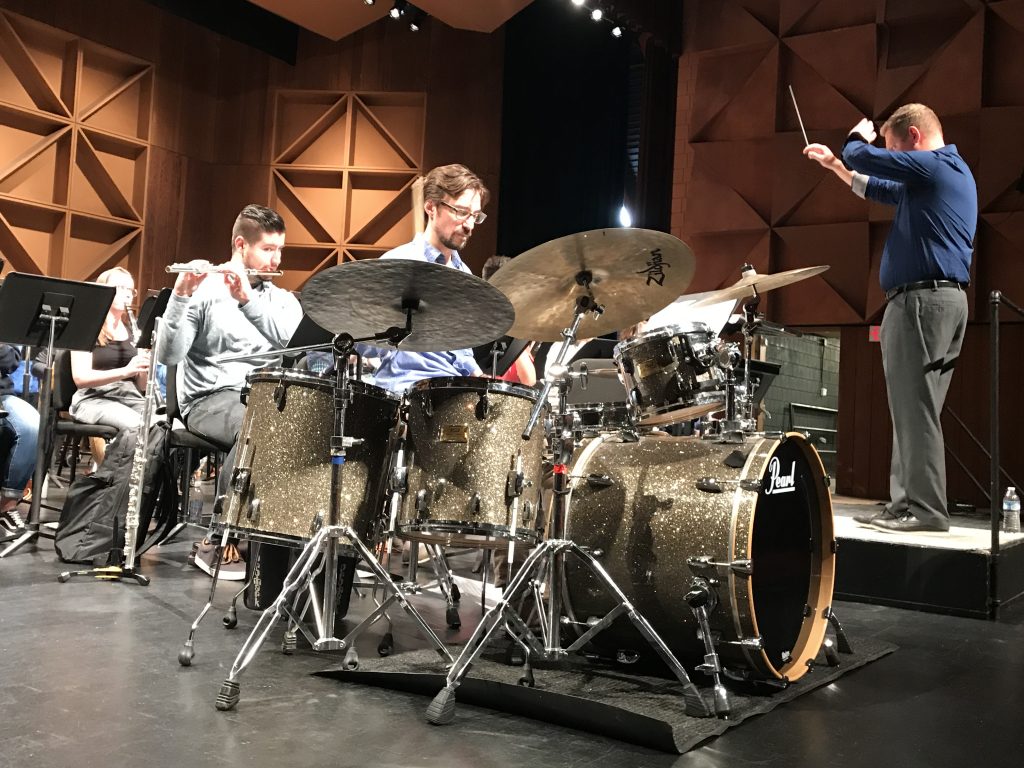
The night before Ziporyn’s newest piece “Impulse Control” a concerto from drum set and wind ensemble received its premiere performance.
“Impulse Control” was performed and commissioned by Dan Piccolo, professor of percussion at BGSU. The piece started with Piccolo and the percussion section, which amplified what he was playing. Then the winds picked up the percussion’s lines and amplified them further, adding tone to the rhythms.
The concert showed how seriously the festival takes the new in its title. Along with the drum set concerto, the second half of the program, featured BGSU professor Susan Nelson playing concerto for bassoon written this year, and “El Chupacabra” by BGSU student Emilio José Gonzalez. The piece won the 2018 Competitions in Music’s composition division.
For the living and even lively composers this festival, Ziporyn said, “becomes all the more critical.”
He reflected on how his musical path was set growing up in Evanston, Illinois. As a teenager he played clarinet in school band and orchestra. One band director also led something called “the weird group.” There they explored the avant garde music of John Cage and Iannis Xenakis.
“It was perfectly poised to blow a 13-year old suburban Chicago boy’s mind,” Ziporyn said.
Another music teacher taught what was blandly called Materials in Music. The content wasn’t straightforward harmony and rhythm. “It was really a cover for her proselytizing for the American experimental tradition,” Ziporyn said.
They listened to Steve Reich and Alvin Lucier, and they composed music based on those principles.
Then like so many composers, Ziporyn heard “Rite of Spring.”
“That’s it,” he said. “Then you spend your whole life trying to do that in some way.”
At the time he was playing piano and clarinet in garage bands and listening to Miles Davis’ “Bitches Brew,” progressive rock, and John Coltrane.
He started writing music for class and he realized: “I’ll never conquer this. This will always be interesting, and I’ll never reach the end of this journey. So that’s a life’s work.”
The music he loved spoke to him with such power and feeling that “I just wanted to see if I could make something have that sort of impact on someone else.”
Tonight (Friday, Oct. 18) at 8 in Kobacker Hall, New Music Detroit will play a concert mostly of Ziporyn’s music including his arrangement of Bjork’s “Unravel.”
On Saturday night at 8, the festival will conclude with a performance in Kobacker by the Bowling Green Philharmonia. The program will include “Sfumato,” commissioned by the orchestra by Mikel Kuehn, of the BGSU faculty, John Corigliano’s “Fern Hill” sung by the Collegiate Chorale, and concluding with Ziporyn’s “War Chant.”


